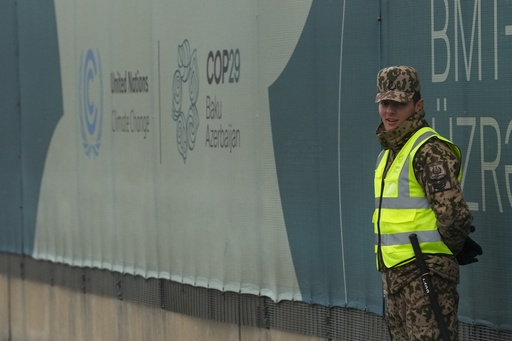BAKU, Azerbaijan — A new draft document unveiled early Thursday, which will underpin any potential agreement at the United Nations climate negotiations regarding financial aid for developing nations transitioning to green energy and adapting to climate impacts, notably omitted a vital issue: the financial contributions from wealthier countries.
At the COP29 discussions in Baku, Azerbaijan, negotiators are striving to bridge the disparity between the estimated $1.3 trillion needed for climate finance by developing countries and the several hundred billion that wealthier nations are currently willing to contribute.
However, critics note that the draft text merely illustrates the divergent views of both parties without offering substantial progress. Li Shuo, the Director at the Asia Society Policy Institute, pointed out that the text fails to move beyond fundamentally presenting each side’s positions.
Rob Moore, Associate Director at the European think tank E3G, emphasized that negotiators must generate significant progress in the coming days, calling for transparent and straightforward discussions involving actual figures.
The absence of financial figures in the draft could indicate a strategic maneuver, suggested Linda Kalcher from the Strategic Perspectives think tank. She remarked that the COP29 presidency should possess more comprehensive information than what was included in the draft and noted that this omission reflects developed nations’ reluctance to reveal their intentions.
Negotiators face three key areas for consensus: the magnitude of financial contributions, the proportions of grants versus loans, and the identities of the contributors.
Observers from the International Institute of Sustainable Development, who can participate in closed meetings of the negotiations, stated that there has been an agreement to refrain from expanding the list of countries involved in global climate funding during this round of talks. Kalcher mentioned that the draft indicates caution towards securing grants and improving access to financing.
On Wednesday, chief negotiator Yelchin Rafiyev acknowledged that the most recent version of the climate finance text is still far from final, but he viewed it as a meaningful advancement. Nevertheless, experts noted that reaching a consensus remains a daunting task, foreshadowing a potential repeat of the dramatic and protracted discussions witnessed in earlier summits.
Iskander Erzini Vernoit, the director of the Moroccan climate think tank Imal Initiative for Climate and Development, stated that some developed countries are gradually recognizing the necessity of over a trillion dollars in financing to keep global warming below the critical threshold of 1.5 degrees Celsius (2.7 degrees Fahrenheit) compared to pre-industrial levels. “Yet, many remain oblivious to this urgent reality,” he concluded.


